The challenge:
Anaphylaxis is the most severe form of an allergic reaction and is potentially life threatening. It is estimated that up to 1 in 40 children in the UK are suffering from at least one serious allergy. Over the past two decades, hospital admissions in the under 15 population have been increasing by 6.6% each year, and prescription of auto injector devices by 336% (Conrado 2021).
EpiPen is the most commonly prescribed adrenaline auto-injector device in the UK. so age-appropriate clinical education on the use of an EpiPen is important.
Standard teaching of anaphylaxis is done by nurses, who train children face-to-face. COVID has driven many appointments to be delivered remotely; it’s vital that training can also be delivered this way.
Facing the limitations of Covid 19 on face to face training, a programme was commissioned as part of a study by the University of Cardiff, led by Emma Balls as part of her PhD. The aim of the study was to compare the effectiveness of the usual ‘standard’ face to face EpiPen training versus an interactive video training in children of primary school age, considering the potential for remote training of children in the future.
The solution:
The study was performed by Emily Balls, a medical student in Cardiff University, under Dr David Tuthill’s supervision. Working in collaboration with Cognitant, an easy-to-understand, interactive video was developed, that children could follow on a tablet or smartphone.
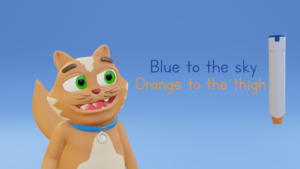
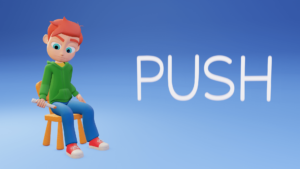
The interactive video was designed for use with patients aged 5-12 and starred a cat named Fizzmo who led the children through the training. Incorporated with the animation were auditory assists and an interactive component, aiming to engage the audience as much as possible.
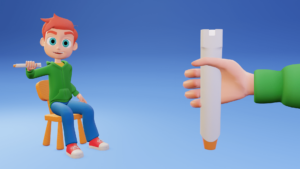
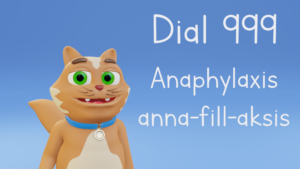
The study included primary school aged children who had never used an EpiPen before. Their competence was assessed following one training session with the pen via five criteria The criteria included being able to identify where to place the EpiPen® on the thigh, using a fist grip around the pen, removing the blue safety cap, using the ‘place and press’ technique and hearing the pen click, and holding the pen in place for three seconds.
This method was tested against current face to face ‘standard’ training. The children who used the interactive video were asked to evaluate it by rating their enjoyment, whether they felt confident in using the EpiPen® and whether they would they like more teaching videos like this.
The results:
Results showed a significant improvement in the ‘hold for 3 seconds’ criterion for the interactive video group, with 80% of children recalling this information in comparison to 57% with the standard method (P=0.007). Feedback also showed that the majority of children enjoyed and understood the video, and would like to be taught in this way again in the future. 96% (n=26/27) of children said that they would also want to watch other interactive videos on topics like this. The average viewing time of the interactive video per session is 5 mins 44 secs.
The results suggested that the pilot interactive video was as effective as the current EpiPen® training programme, which is delivered in person. It is now hoped that this pilot study will be able to support the use of such technology and learning in the future, helping to reduce pressures on healthcare staff to administer this training.
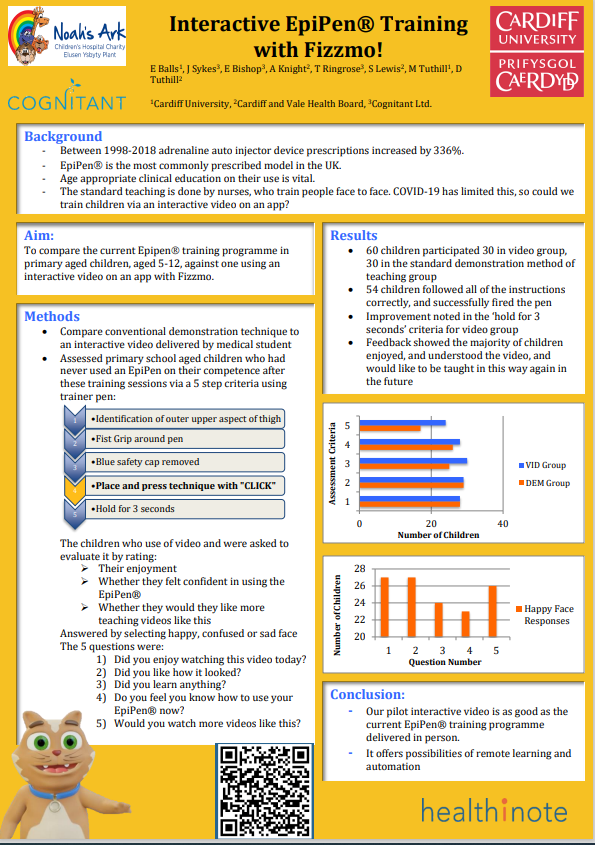
Testimonials
“We are really pleased with the results from this pilot study, as it showed that children can be taught how to use EpiPens®. in a new way. They were also better able to remember to hold their EpiPen on the thigh for longer. We hope in the future that this novel way of delivering care will mean primary school children can be taught remotely about EpiPens®. With anaphylaxis on the rise, sufficient child-friendly education into initial treatment for the condition is really needed. Being able to improve how children recall the information they are given is transformational.”
Dr David Tuthill, Consultant Paediatrician at the Children’s Hospital for Wales
“This pilot was incredibly insightful for us as we had the opportunity to really explore how children consume health information and whether they would accept a digital delivery method. The project shows the innovative methods of technology that can be incorporated into clinical education for children. It demonstrates the importance of accessing resources designed to be understandable and effective. This is imperative for the delivery of safe and innovative education, especially in the current COVID-19 pandemic and ‘digitalising’ NHS.”
Emily Balls, Medical Student at Cardiff University
Cognitant
Looking to empower people with health information for better patient outcomes?
Additional Case Studies
Co-Creating a Personalised Digital Storybook for Children with Atypical Hemolytic Uremic Syndrome (aHUS)
June, 2025
Challenge Atypical Hemolytic Uremic Syndrome (aHUS) is a rare, life-threatening disease characterised by blood clots forming in small vessels, leading to kidney failure, anaemia, and...
Asthma Essentials
January, 2025
[embed]https://youtu.be/qmeiwjCr9Go[/embed] The challenge: Asthma remains a major health concern in the UK, affecting 5.4 million people, including 1.1 million children. Each year, the condition leads...
Cognitant successfully streamlines a top 10 pharma Patient Support Programme
July, 2024
A top 10 pharma company challenged Cognitant to optimise their Patient Support Programme (PSP) for an injectable medication, with the aim to streamline approvals, save...